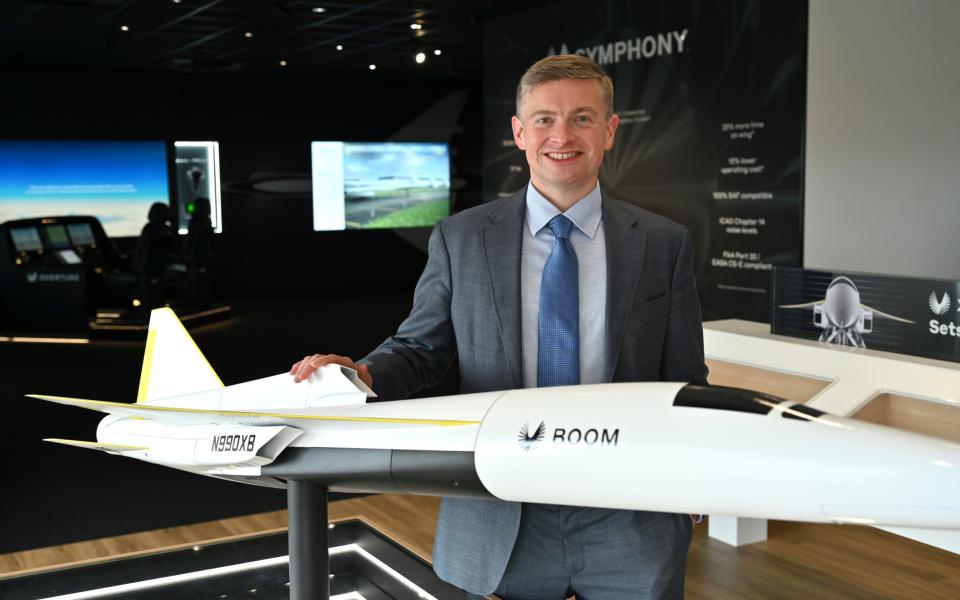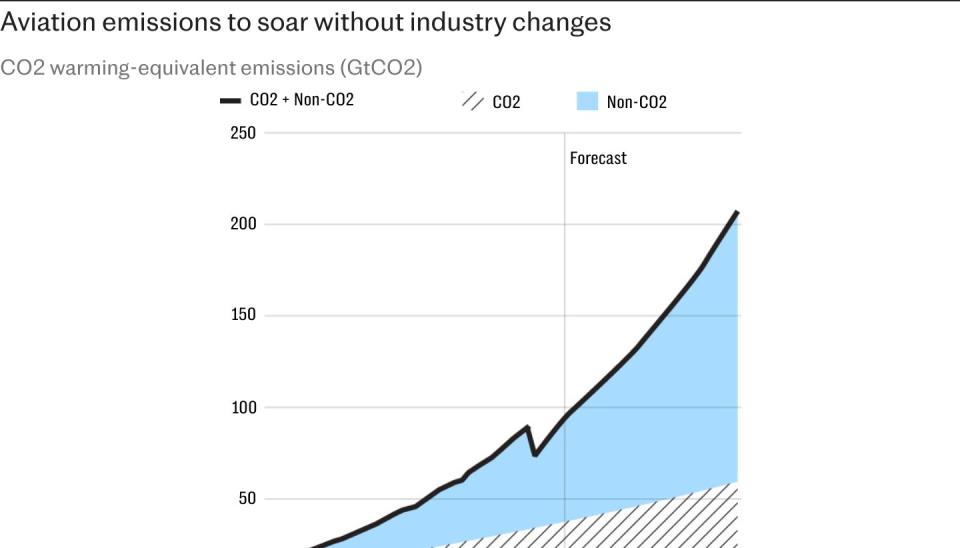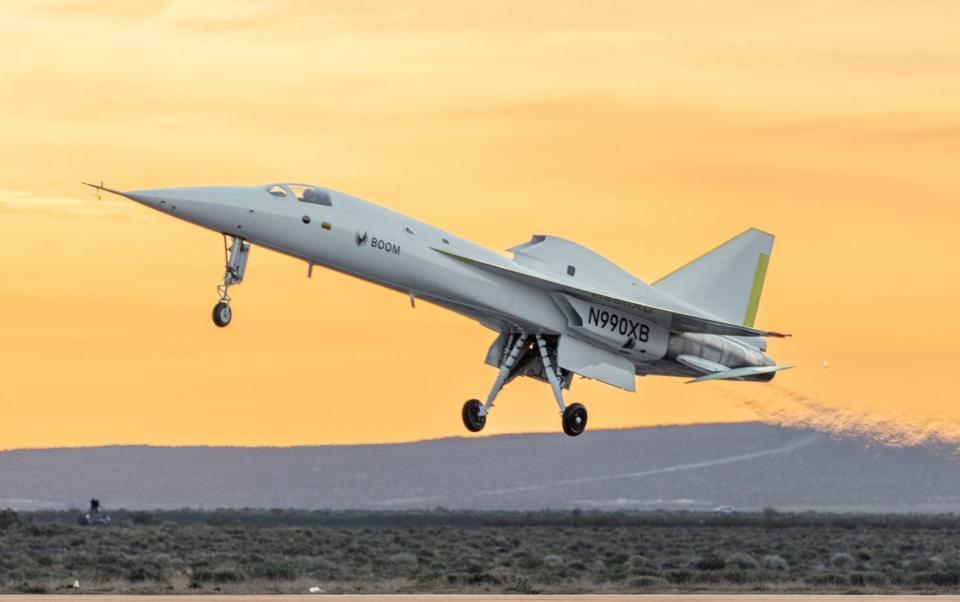The founder of the company seeking to build a successor to Concorde has hit back at “flight shaming” activists who are demanding an end to mass air travel.
Blake Scholl, of Boom Supersonic, said that the demand to cut back on flights for the sake of limiting CO2 emissions is “depressing”.
He said: “There are some people who look at this and say, ‘Well, I guess we should all have less things. We should use less energy, we should go to fewer places.’ There’s been a lot of virtue-signalling and it’s very depressing.
“I believe in a future of abundance. I believe the north star is human flourishing and that we should build a future in which more people can go to more places more often.”
Mr Scholl, who spoke at last month’s Farnborough International Airshow where Boom unveiled the cockpit for its proposed 64-seat, 1,300mph Overture jet accompanied by four former Concorde pilots, argues that so-called flight shamers are ultimately seeking to stifle human progress.

He said: “Can you imagine this conversation on Zoom? It’s so much worse. I want our kids to grow up in a world where they’ve gone to other continents, they’ve broken bread with other people, they’ve experienced our shared community.
“To do that we need flights that are faster, we need to be at a price point people can afford, and, yes, we need to care for the planet.”
Denver-based Boom, which has 130 orders and commitments from American Airlines, United Airlines and Japan Airlines, is the last man standing in the commercial supersonic industry after rival Aerion collapsed three years ago.
The Overture is priced at $200m (£160m), excluding interiors – less than the sticker price for the cheapest widebody jet. Boom is aiming to start deliveries from 2029.
All told, Scholl said airlines would need more than 1,000 of the planes, based on the number of people who fly business class today on routes where demand for supersonic travel would be sufficient to boost profits.
He predicts that “every major international airline is going to need supersonic to stay competitive”.


Yet as service entry draws closer, Scholl is bracing for a further backlash from flight-shamers, readying his defence of a plane that would cross the Atlantic in three and a half hours.
The key to reducing supersonic emissions, he contends, lies in the adoption of sustainable aviation fuel (SAF), just as it does for subsonic flights. Scale up production to the extent that planes can fly on 100pc SAF and even the Overture can be carbon neutral.
He said: “It’s the only fuel that is at all compatible with the aeroplanes we already have, and it’s the only fuel that is dense enough to be able to carry people for a long distance. But we have to have enough of it.”
Flying twice as fast as conventional aircraft, supersonic jets will also burn fuel for only half as long, though they require at least seven times the energy intensity.
Mr Scholl said: “The aeroplanes are twice as fast so it’s also going to decarbonise twice as fast. We’ve got to look at solutions that are scalable and cost effective.”


Still, the International Council on Clean Transportation think tank says calculations show that deploying SAF on supersonic flights would be a poor use of the fuel.
When produced synthetically using green electricity, SAF might cut supersonic CO2 emissions by 90pc. Yet the gain versus a subsonic plane burning traditional kerosene would be no more than 24pc, it says, citing joint research with the Massachusetts Institute of Technology.
Mr Scholl said that the four-engine Overture would comply with the same noise standards that govern other aircraft, and would go supersonic only when travelling over the sea, a limitation that will nevertheless permit the plane to operate on around 600 routes.
He said: “If you speak to people who were under the path of Concorde, they all smile. They kind of miss it. But there are going to be a lot more Overtures, so you’ve got to be quiet.
“The engines, the whole aeroplane is designed for quiet operation, and the sonic boom we’re going to put out over the open ocean where no one’s going to hear it.”
Boom aims to produce 33 aircraft a year at its factory in North Carolina, which was completed in June, and double that number when a second assembly line is added.
The company’s XB-1 demonstrator, which Scholl described as the world’s first independently developed supersonic jet, flew over the Mojave desert in March and is due to take to the air for a second time as early as this month before going supersonic later in the year.


Boom is also developing its own engines for the Overture in conjunction with Kratos, which helped design turbines for the F-22 and F-35 fighters, after dropping plans to buy them off the shelf from Rolls-Royce.
Because they will be built to run for several hours at full thrust, unlike subsonic engines, operating and maintenance costs would be lower, Scholl said, “so the fares can come down and more people can fly supersonic”.
Together with opposition from the green lobby, the biggest hurdle for Boom may be its ability to continue raising capital, a lack of which led to the demise of Aerion after backers that had included Boeing, Lockheed Martin and General Electric pulled out.
Scholl said the Overture, which has so far attracted $700m in funding, was a multibillion-dollar programme that must sustain investor and customer interest as each milestone passes.
Still, Boom stands out for its ambition in an industry where Boeing and Airbus last launched wholly new planes 20 years ago and do not plan to do so again until the mid-2030s.
Scholl said: “It’s clear to me that now’s the time. The legacy guys are going a whole generation without building anything new. Airline CEOs are saying they want something, passengers, you say supersonic and they hit the roof. People want this and they deserve it.
“There’s no guarantee of success here, but if we pull this off we’ll have built one of the most valuable companies on the planet.”
Mike Bannister, former chief pilot of the British Airways Concorde fleet, put the Overture through its paces on a simulator at the Farnborough International Airshow and said it represents an “unbelievable” level of progress for the industry that should not be suppressed.
He said: “People have always wanted to travel faster. That’s why we domesticated the horse 5,000 years ago, and why we invented the motor car, the plane and then the jet engine.
“Supersonic flight is an extension of that and there’s definitely a market. In business, speed and time are quite literally money, and in the leisure market people are increasingly willing to spend more on a premium flight. I’d like to see this happen.”
Scholl himself is adamant that technological gains must not be sacrificed on the altar of climate politics and that science, rather than abstinence, holds the key to reaching aviation’s target of net zero carbon emissions by 2050.
He said: “I want to have a future where we have more and better things for us as humans, and we make the world around us a place that we can enjoy even more.
“We can absolutely have that future. We just have to build it.”
Source Agencies



